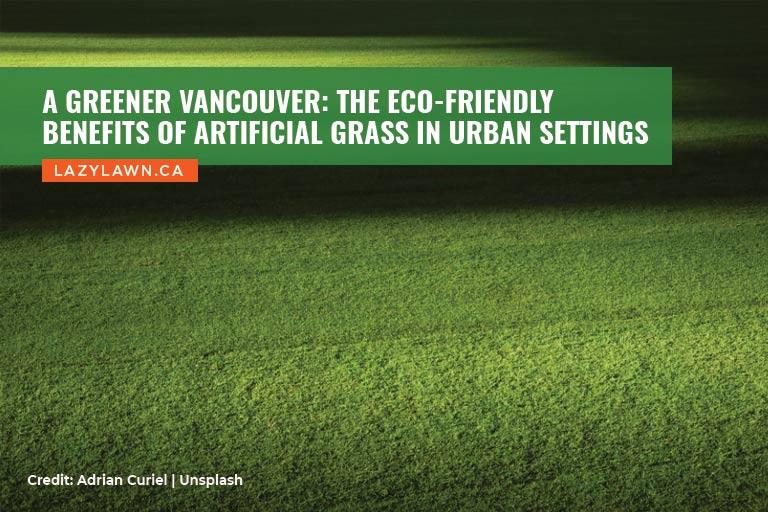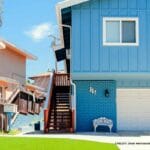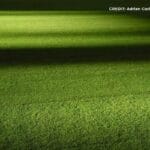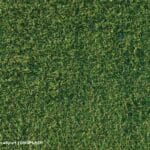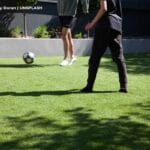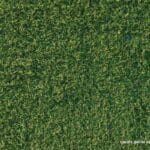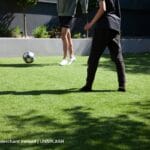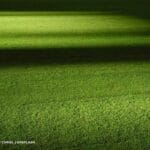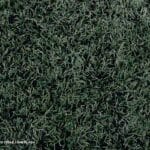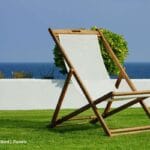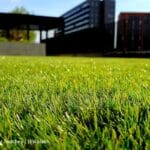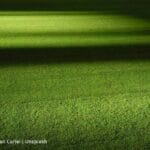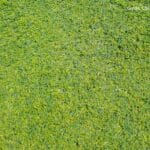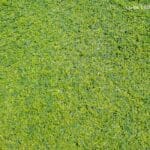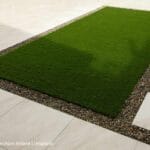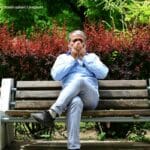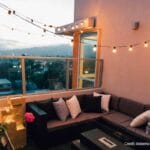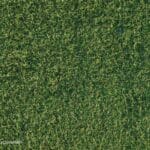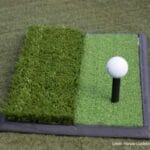Picture this: a lush, green lawn that requires no watering, no mowing, and no pesticides. Sounds like a dream, right? Well, thanks to advancements in artificial grass technology, this dream is becoming a reality for many urban dwellers in Vancouver and beyond.
As environmental concerns continue to grow, cities like Vancouver are actively seeking sustainable solutions to reduce their ecological footprint. One such solution gaining traction is the use of artificial grass in urban landscapes. While it may seem counterintuitive, artificial grass offers a surprising array of eco-friendly benefits that can contribute to a greener and more sustainable urban environment.
The Environmental Impact of Traditional Lawns in Urban Settings
Maintaining the manicured lawns that grace many Vancouver homes comes at a considerable environmental cost:
- Water Waste: British Columbia experiences dry summers despite its reputation for ample rainfall. Traditional lawns require significant irrigation during these periods, straining local water resources and potentially contributing to water scarcity in Vancouver, especially during droughts. This excessive water use not only impacts the environment but also increases homeowners’ utility bills.
- Chemical Runoff: The pursuit of a pristine lawn often involves the use of fertilizers, herbicides, and pesticides. Rainwater and irrigation can carry these chemicals into storm drains and eventually into local waterways like the Fraser River, harming fish, amphibians, and other aquatic life. Additionally, these chemicals can contaminate groundwater, posing a risk to drinking water sources.
- Noise Pollution: Lawnmowers and leaf blowers are major contributors to noise pollution in urban areas like Vancouver. The constant hum of these machines not only disturbs residents’ peace and quiet but can also have detrimental effects on local wildlife. Birds may abandon nests, and other animals may experience stress and altered behaviour due to the noise.
- Carbon Footprint: Gas-powered lawn equipment releases harmful greenhouse gases like carbon dioxide, contributing to climate change and air pollution. In densely populated Vancouver, the cumulative emissions from countless lawnmowers and leaf blowers can be substantial. This contributes to smog and respiratory problems for residents.
- Habitat Fragmentation: Traditional lawns, consisting primarily of non-native grasses, replace diverse native plant communities. This loss of biodiversity disrupts the natural food web, impacting pollinators like bees and butterflies, as well as birds and other animals that rely on native plants for food and shelter. This can lead to a decline in local wildlife populations and an overall imbalance in the ecosystem.
How Artificial Grass Helps the Environment
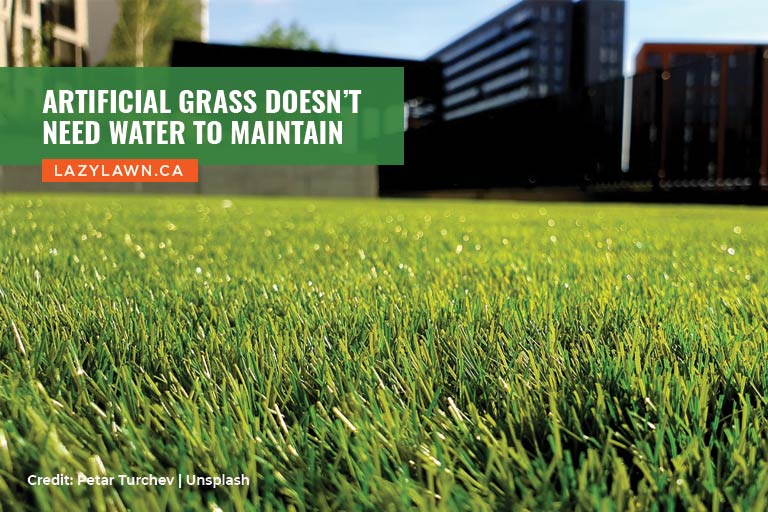
Artificial grass offers a refreshing alternative to traditional lawns, addressing many of the environmental concerns associated with their maintenance:
- Water Conservation: Unlike thirsty natural lawns, artificial grass doesn’t require any irrigation, aligning with Vancouver’s water conservation efforts and reducing strain on local resources, especially during dry periods. This can significantly lower your water bill and help conserve this precious resource.
- Chemical-Free Maintenance: Say goodbye to fertilizers, herbicides, and pesticides that can harm the environment. Artificial grass thrives without these chemicals, preventing harmful runoff that can pollute soil and waterways, and protecting local ecosystems and beneficial insects.
- Quieter Neighbourhoods: No more noisy lawnmowers or leaf blowers! Artificial grass eliminates the need for gas-powered equipment, contributing to quieter, more peaceful neighbourhoods and minimizing disruptions to both residents and wildlife. You can enjoy your outdoor space without the constant noise and fumes.
- Reduced Carbon Footprint: By eliminating the need for gas-powered lawn maintenance equipment, artificial grass helps lower greenhouse gas emissions, supporting Vancouver’s commitment to combating climate change. This eco-conscious choice contributes to a healthier planet for future generations.
- Biodiversity-Friendly Designs: While not a natural habitat, artificial grass can be integrated into landscaping designs that incorporate native plants and pollinator-friendly flowers, creating a more biodiverse and welcoming environment for local wildlife. This promotes a healthier ecosystem and can even attract beneficial insects like bees and butterflies.
Additional Benefits of Artificial Grass in Urban Areas
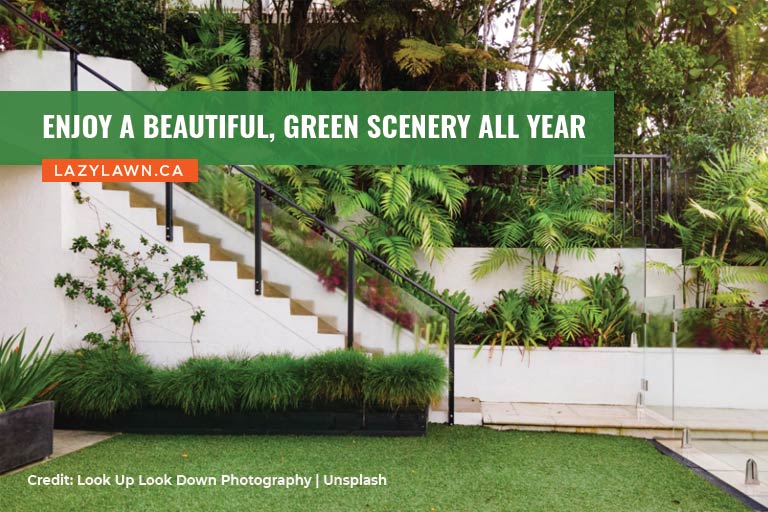
Beyond its positive environmental impact, artificial grass offers a range of practical advantages for urban dwellers in Vancouver:
- Year-Round Greenery: Vancouver’s climate, with its damp winters and temperate summers, presents a unique challenge for maintaining a consistently lush lawn. Natural grass often struggles to maintain its vibrancy throughout the year. Artificial grass, on the other hand, remains verdant and inviting regardless of the season, ensuring a visually appealing landscape year-round.
- Enhanced Safety: Uneven natural turf can pose a tripping hazard, particularly for active children and playful pets. Artificial grass offers a solution with its consistently smooth and level surface. This significantly reduces the risk of slips and falls, creating a safer outdoor environment for everyone to enjoy.
- Increased Usable Space: Many urban areas in Vancouver have limited space for greenery. Artificial grass opens up possibilities by thriving in locations where natural grass falters. It can be installed on rooftops, balconies, and in shaded areas, transforming previously underutilized spaces into vibrant outdoor retreats.
- Reduced Allergens: For individuals with allergies, natural grass can trigger unpleasant symptoms due to pollen and other allergens. Artificial grass, being hypoallergenic, eliminates this issue. This allows allergy sufferers to fully enjoy their outdoor spaces without discomfort or irritation.
Addressing Common Concerns About Artificial Grass
While the benefits of artificial grass are compelling, it’s important to address some common concerns:
- Heat Absorption: Some types of artificial grass can become hot to the touch in direct sunlight. However, advancements in technology have led to the development of artificial grass with heat-reflective properties, mitigating this issue.
- Microplastics: Concerns have been raised about the potential for microplastics to be released from artificial grass. However, studies are ongoing to assess the extent of this issue and develop solutions to minimize any potential environmental impact.
- Aesthetics: While modern artificial grass has come a long way in terms of realism, some may still prefer the look and feel of natural grass. Ultimately, the choice between natural and artificial grass comes down to personal preference and priorities.
As Vancouver continues its journey towards becoming a greener city, artificial grass emerges as a sustainable and practical solution for urban landscapes. Its ability to conserve water, reduce chemical use, minimize noise pollution, and lower carbon footprints aligns perfectly with the city’s environmental goals. By embracing this innovative alternative, Vancouver residents and businesses can contribute to a more sustainable future while enjoying the benefits of a beautiful, low-maintenance lawn.
If you’re ready to explore the benefits of artificial grass for your Vancouver property, Lazy Lawn Canada offers a wide range of high-quality, eco-friendly artificial grass solutions. Contact us today at 1-888-622-5296 to discover how you can create a greener, more sustainable outdoor space.

